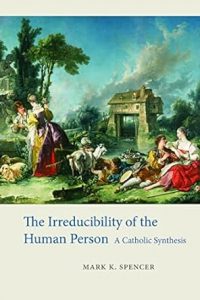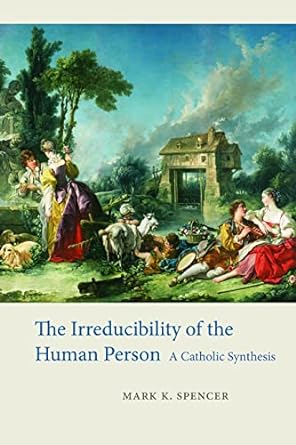Spencer, Mark K. The Irreducibility of the Human Person: A Catholic Synthesis. Washington D.C.: The Catholic University of America Press, 2022. 448 pages. $34.95.
The Irreducibility of the Human Person: A Catholic Synthesis is a rich philosophical exploration of the foundations for a theological anthropology. Mark K. Spencer covers tremendous ground that provides a unique contribution to the literature in the philosophy of theological anthropology—closely aligned with theological anthropology proper. Spencer’s treatment of the human person is less like a well-prepared steak and more like a buffet, but a themed buffet where the master chef has carefully chosen all the dishes, arranged them, and done so in a way that each mutually inform one another providing the palette with a variety of related dishes that make one both full and artfully satisfied. Let me explain what I mean by this by highlighting some of the features of The Irreducibility of the Human Person.
Spencer contributes a novel reflection on the human person, but unlike most treatments that are largely coming from this or that tradition he blends the worlds of philosophical discourse in a harmonious way. It is analytic in that it prizes clarity, logical rigor, conceptual clarification, and drawing from the tools of the analytic philosophical tradition. His treatment surpasses, in some ways, the analytic tendency to prepare and cook a high-quality steak that is not only well-seasoned but craftily cooked with precision. Instead, Spencer’s treatment of the person is far more synthetic, holistic, and historically sensitive with a bit of fat. Good fat, as many recent dietitians will attest, is a necessary part of a healthy well-rounded diet and it can be quite savory. So, in this way it is as the Thomist would define it aimed at the good, but also pleasurable. While this sensibility and set of skills is reflected in Spencer and often reflected in treatments outside the analytic literature, this is not to say that no analytic philosophers of religion and theologians are concerned with a more well-rounded diet that prizes synthesis, systematics, history and the like. One such fine example leaning in this direction that stands out amongst the analytic religious literature is the recent T&T Clark Handbook to Analytic Theology. But, as most honest philosophers and theologians will attest, it is actually quite difficult to demarcate between the analytic and continental traditions. There are varying characteristics that, one might argue, are artfully displayed in each of the respective traditions. Spencer, however, not only courageously defies these categorical demarcations, he positively brings them together in this fine volume. He reminds me of the rare exception to the analytic tradition emulated in the likes of the great Stephen Priest who, like the master chef, is able to carefully prepare not just one dish (that would be good all on its own) but multiple dishes that are arrayed in such a fashion as to enhance the individual dishes as a complete meal.
Spencer is likened to the master chef of the buffet in another way. By working in the Thomist tradition, he contributes to the recent set of philosophical foundations for theology literature. Notable examples of this recent and growing literature include J. T. Turner’s On the Resurrection of the Dead, Edward Feser’s Aquinas, along with the philosophy and theology adjacent treatments from Jeffrey’s Brower’s Aquinas’s Ontology of the Material World, and J. P. Moreland and Scott Rae’s excellent broad treatment of Aquinas in Body and Soul with insights from science as exemplified in Matthew Owen’s fine treatment Measuring the Immeasurable Mind. Turner’s being the most notably theological of the bunch. There are other worthy Thomist works deserving a mention from the likes of Robert Koons on the analytic side and Adam Cooper on the more continental and theological side of the aisle. Of course, Spencer’s exploration differs from these not in his analytic sensibilities but in his desire to capture something often missing in the analytic Thomist treatments—namely that which is, arguably, uncapturable by analytic propositions and minimized in most Thomist accounts, the irreducible nature of each person. The fundamental uniqueness of persons is often an insight from modern philosophers of which earlier Thomist’s were simply not concerned. So, on the other side, Spencer reminds me of other Thomist treatments found in the existential Thomists and the phenomenologists. He is arguably the philosophical parallel to the Thomist theologian Matthew Levering for his insightful engagement across traditions and his breadth of Thomist knowledge.
But, there is another way in which The Irreducibility of the Human Person is likened to the master chef of a grand and beautiful buffet. Spencer displays a knowledge of the Thomist literature across the Roman Catholic theological tradition. In this way, his buffet is not only thematic and focused, but, as anyone familiar with the Roman Thomist literature, it is vast. Naturally, Spencer could have engaged with a wider set of literature in Thomism and in the Reformed traditions, but, in this way, his aims are clear. And, he capably brings a synthesis across the Catholic Thomist literature while seasoning these accounts with the insights from the phenomenologists.
While space is short, I am unable to explore and analyze all the themes and contributions found therein. Spencer covers a broad range of topics from metaphysics, to phenomenology, and finally theology.
With all that has been said of a positive nature, there are some criticisms that might hinder those dining at Spencer’s table. The palette required to taste all the variant flavors is quite extensive, generally speaking, which will make it difficult to taste all the variant flavors. However, more specifically, one of the aims of Spencer is to show why Thomist hylomorphic dualism is superior to both substance dualism and idealism. He attempts to do this by extrapolating the virtues of Thomism. While giving a nod to Descartes’ valuable contribution that we are not simply souls but unique souls not explainable by metaphysical complexity, Spencer seems to think Thomistic phenomenology can provide an accounting without being compromised by Thomas’s matter-form composite metaphysics. I’ll leave the reader to decide whether he is successful on this point—I am not so confident. The related problem of what has been called ‘Thomist survivalism’ in the disembodied discussions, too, remains complex and will, undoubtedly, be controversial (see specifically pp. 316-325).
Often simultaneously giving a nod to Cartesianism, Spencer also gives a nod to idealism as having numerous resources to account for the human person. But, according to Spencer idealism suffers from an insufficient account of the material body of which Thomism is superior. Carefully pointing out the tendency amongst some toward materialist emergentism, he states: That we can predict what someone is thinking about based on neural activity (or other bodily signs) merely shows that intellect and sense are connected, but it does not show the nature of that connection. Features of intellect already considered show that it first raises sense to share its mode of being, rather than (as emergentism has it) being caused by sense in a “bottom-up” way, so much for materialism or its cousin-emergentism (see p. 79, p. 102 fn. 86, p. 256). As far as it goes, most dualists and idealists agree. But Spencer argues that idealism reduces individual persons to concepts to be grasped, which undermines irreducibility. This is a fascinating line of objection to idealists and one that is not without some warrant—although I am sure there are viable responses. Something like a Berkeleyan idealism would not fall prey to this objection because all ideas are communicated by one mind—the Divine mind. Created minds are rather originary ideas in the mind of God but published as it were as substances with powers in their own right and by themselves (one way of articulating the independence criterion of substance). So, Berkeley’s idealism is not obviously susceptible to this objection. Neither is a kind of Cartesian substance dualism. But, Spencer does have an objection to Descartes as well.
He objects that Descartes and his progeny are susceptible to the ‘interaction’ problem. His solution is that a more robust account of matter where souls are not only intellect that transcend materiality but also serve as the informing principle for matter, thus making this matter and not that matter. He argues that an ‘experientially motivated hylomorphic distinction between two kinds of contact’: one that is spatial and the other that permits actuality and potentiality to connect (p. 170). Apart from two common responses: (1) simple dualists posit a singular relation, and (2) that the interaction problem is an overrated objection, there may be more to say in favor of either dualism or idealism that posits a sufficiently rich account of contact between the two substances or sets of properties. Both dualists and idealists, are, of course, able to draw from versions of Divine occasionalism that permit a robust exchange between matter and soul that is rooted in Divine intentionality. In a similar way, Descartes’s interpreters like Suarez have moved in a parallelism direction that permits a two-way exchange of information that is originally designed by God. There is also likely a hybrid view of these two views that is suggested by Descartes and one that leans hylomorphic without buying wholesale into Aristotelian metaphysics. Some interpreters are happy to call Descartes’ mind-body view hylomorphism, but this is probably a bit mis-leading. He certainly affirms that the mind is present at each part of the body intellectually, yet not spatially. He readily affirms that the mind has a unique relation to the body and gives intellectual sense to it. Additionally, he has a complicated view that the body sends-representation information to the mind that is translated into ideas by the mind yet he does so without the mysterious distinction found in Aristotle. Causally, the body can send signs to the mind as a trigger that God designs to receive information about the world. In other words, the movements of the body become ‘occasions’ for the mind that are triggered by the body and parallel the body in those instances. With that sketch in mind, it’s important to point out that it is not clear that a Thomist hylomorphic ontology is necessary to explain the world and our relation to it as irreducible creatures.
While The Irreducibility of the Human Person is a masterful treatment of numerous subjects, at times the reader will feel as if Spencer is drawing from a number of resources that arbitrarily thicken up his Thomism, but it is not always clear that the same couldn’t be done by the Christian idealist (of the Berkeleyan variety) or the Christian Cartesian. Nonetheless, Spencer’s The Irreducibility of the Human Person deserves re-visiting as it brings together several distinct plates that beautifully complement one another for the refined palette. It would not serve the introductory student to Aquinas, but it would be a useful text in an advanced undergraduate or graduate course on Thomism and the philosophy of theological anthropology.
Joshua R. Farris
Humboldt Experienced Scholar Fellow, Ruhr Universität Bochum





